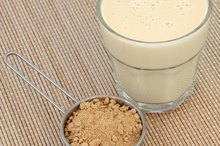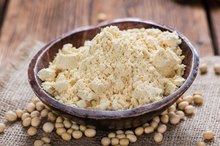What does fact checked mean?
At Healthfully, we strive to deliver objective content that is accurate and up-to-date. Our team periodically reviews articles in order to ensure content quality. The sources cited below consist of evidence from peer-reviewed journals, prominent medical organizations, academic associations, and government data.
- U.S. Food and Drug Administration: GRAS Determination - Isolated Wheat Protein
- Nutrition and Metabolism: Leucine Content of Dietary Proteins Is a Determinant of Postprandial Skeletal Muscle Protein Synthesis in Adult Rats
- Nutrition and Metabolism: Leucine Content of Dietary Proteins Is a Determinant of Postprandial Skeletal Muscle Protein Synthesis in Adult Rats
The information contained on this site is for informational purposes only, and should not be used as a substitute for the advice of a professional health care provider. Please check with the appropriate physician regarding health questions and concerns. Although we strive to deliver accurate and up-to-date information, no guarantee to that effect is made.
Wheat Protein Isolate vs. Whey
If you're upping your intake of protein to build or strengthen your muscles, you may turn to protein powders for convenience. Wheat protein isolate and whey protein are two options you may consider. Both proteins are rich in the amino acids your muscles need, but if you have an allergy you may need to consider one over the other.
About the Proteins
Wheat protein isolate is created by turning gluten, the main protein in wheat, into free amino acids. While nutrition information may vary depending on manufacturer, a 24-gram scoop of one commercially available wheat protein powder contains 100 calories, 20 grams of protein, 1 gram of fat and 3 grams of carbs 1.
Whey is a protein found in the liquid portion of coagulated milk. A 20-gram scoop of whey protein contains 75 calories, 13 grams of protein, 1 gram of fat and 3.5 grams of carbs.
- Wheat protein isolate is created by turning gluten, the main protein in wheat, into free amino acids.
- While nutrition information may vary depending on manufacturer, a 24-gram scoop of one commercially available wheat protein powder contains 100 calories, 20 grams of protein, 1 gram of fat and 3 grams of carbs 1.
Special Diet Needs
Wheat Chex Cereal Nutrition Information
Learn More
Milk and wheat are two of the most common food allergens. If you have an allergy to milk, you may want to avoid using the whey protein. Also, if you have an allergy to wheat or gluten, you want to avoid using the wheat protein isolate. Wheat protein isolate manufacturers market their product as lactose-free, but whey protein powders are also lactose-free. Additionally, as a nonanimal-based protein powder, the wheat protein isolate may be preferable to people following a vegan diet.
- Milk and wheat are two of the most common food allergens.
- If you have an allergy to milk, you may want to avoid using the whey protein.
Building Muscle
If building muscle is your goal, whey protein may be more suitable. A study published in Nutrition and Metabolism in 2012 found that protein powders rich in the amino acid leucine, such as whey protein, are better at building muscle, at least in rats 23. However, you may be able to find wheat protein isolate powders with added leucine. Also, this data is based on animal studies, and human studies may show different results.
- If building muscle is your goal, whey protein may be more suitable.
- Also, this data is based on animal studies, and human studies may show different results.
Using Protein Supplements
Side Effects of Zymex
Learn More
It's OK to use protein supplements, but you may be missing out on all the additional nutrients you get when you eat the whole food 2. Milk, for example, is not only a good source of protein, but is also rich in calcium and potassium. And whole grains like wheat are rich in B vitamins, iron, magnesium and fiber. Plus, eating the whole food as opposed to taking a supplement may be more satisfying.
- It's OK to use protein supplements, but you may be missing out on all the additional nutrients you get when you eat the whole food 2.
Related Articles
References
- EAS Sports Nutrition: 100 Percent Whey Protein Powder
- Shape: Get the Scoop on Protein Powders
- Nutrition and Metabolism: Leucine Content of Dietary Proteins Is a Determinant of Postprandial Skeletal Muscle Protein Synthesis in Adult Rats
- American College of Allergy, Asthma and Immunology: Food Allergies
- U.S. Department of Agriculture and U.S. Department of Health and Human Services: Dietary Guidelines for Americans, 2010
Writer Bio
Jill Corleone is a registered dietitian and health coach who has been writing and lecturing on diet and health for more than 15 years. Her work has been featured on the Huffington Post, Diabetes Self-Management and in the book "Noninvasive Mechanical Ventilation," edited by John R. Bach, M.D. Corleone holds a Bachelor of Science in nutrition.









